In the lot next to the American Airlines terminal a Muslim man seated on a milk crate is splashing his face with cold water from a jug. He pours it over his bare feet and both hands and then passes the container so his neighbor can do the same. Before them, eight rows of yellow taxis, inching toward LaGuardia Airport in a self-inflicted traffic jam. The men are cab drivers, and they are preparing to pray. Here, in the airport’s taxi holding lot, Muslim cabbies deposit their cars after they’ve delivered their passengers. They ritually purify themselves, either in the restroom or outside with the water jug, and circle around the back of the snack stand, where rugs have been laid out on the pavement. Facing east, toward Mecca, they prostrate themselves before the Divine.
It is raining heavily this evening, but shifts of shoeless men are kneeling in the open air all the same. Thousands of them will have passed through here by the end of the day. In the stall, the snack vendor sells halal rice and instant noodle soup. The dingy tiles of his stand are covered in black marker: ‘Ford Esquire 2008 for sale’ and ‘Need Day Driver.’ The devout pray quickly, streaming in and out of the space every few minutes, and when they are done, return wet to their cars and join the line of cabs headed back to the city. It is time again for work.
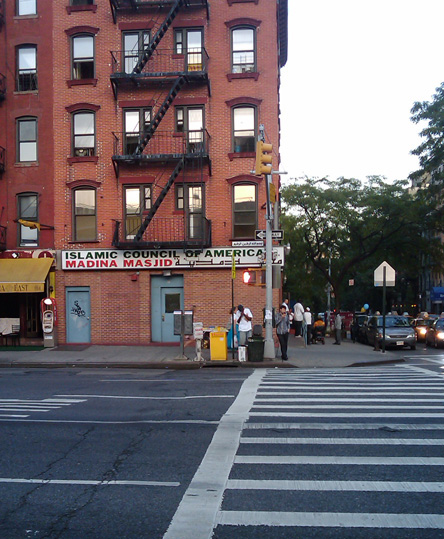
Roughly half of New York City’s 40,000 taxi drivers are Muslim. They are itinerants, and their destination is rarely a matter of personal choice. But they are also followers of Islam, practitioners faithful to a call to pray that sounds five times a day. Muslim prayer is not particularly straightforward: It involves ablution followed by a series of prostration positions carried out in a relatively clean space. The prayer itself rarely takes more than ten minutes, but it must be performed on time. There are five periods of worship; some periods last longer than others. The maghrib prayer period typically begins at sunset and only goes on for about forty minutes; the isha’a prayer period begins around 9 p.m. and stretches until dawn. Sometimes the drivers are forced to forfeit passengers, sometimes to take roundabout routes in the search for an appropriate site. In desperate times, devotees bring out a small rug they keep in the trunk and pray in the backseat. Most have memorized a city-wide circuit of improvised prayer spaces that suffice when one cannot reach a mosque. As one cabbie told me emphatically, “The most important thing is not to let the prayer expire. Just park and do it.”
I have, for a long time, been interested in how religious rituals are modified to suit modern circumstance, perhaps because I’ve adapted a good number of them myself. Sociologists of religion often cite Muslim cabbie prayer strategies as exemplifying the ways in which immigrants blaze new religious trails in cosmopolitan cities like New York. When I first began to talk to Muslim taximen, I was under the impression they were tailoring their faith to meet the demands of their job. It seemed to me they were taking a rather stringent, age-old rite and, to some extent, bending it to suit the new and diverse religious landscape in which they now find themselves. But I no longer think that is the case. The drivers are tailoring their job to meet the demands of their faith. The recently-arrived immigrants I have encountered, young men from Islamabad, Istanbul and Alexandria, do not feel much of a difference between the prayer program they ascribed to back home and the one they follow in New York, save for the seamy state of so many of the mosques here. They do not feel they are making a sacrifice. More exactly, there is a sacrifice being made, but what they are giving up is not service to God. It comes in the form of parking tickets, lost fares, and a seven-day work week.
To better understand the ritual life of men on the move, I spent 11 days riding with eight Muslim taxi drivers, traveling through New York City neighborhoods, from Long Island to the Upper West Side. In their cabs they spoke to me about the challenges and impromptu resolutions that make up a religiously-committed driver’s shift. And they showed me, as well, pointing through the front windows at their own prayer haunts, at men streaming into mosques and the double-parked taxis they leave worriedly behind them. As we wound through congested avenues, I rested in the back seat, helping them scan the streets for a place to stop. I watched them sprint from their cars and then pray calmly, quietly. En route, minutes and seconds are of the essence. In prayer, all anxiety seems to dissipate.
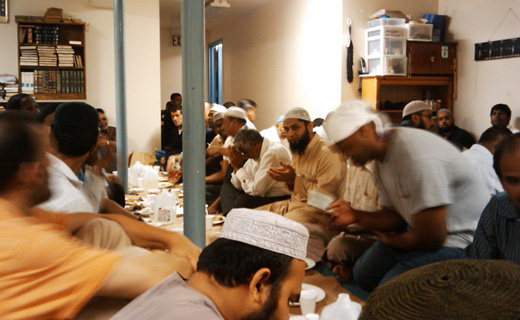
Improvising
Mirza Iqbal, 53, drives me back to my Manhattan apartment from LaGuardia when he is finished praying. He is an elegant-looking man with a coarse white beard and a pale skullcap. His face is leathery, his voice gentle and low. Iqbal came to Brooklyn from Pakistan 20 years ago and has been a taxi driver ever since. His shift begins at 5 p.m. and, on Fridays and weekends, might run until 4 a.m. We review prayer basics. Muslims can pray absolutely anywhere, even bowed over on the side of the road. “God doesn’t say the ground is dirty,” he tells me. But it is considered advantageous to pray in a group. “We usually try to make it together. The together prayer is better than the alone prayer.” Iqbal has only had to pray in his car twice. One of these times, he dropped a passenger off in New Jersey and, on his way back to the city, ran into heavy traffic. He was forced to stop at a rest area off the highway and perform the rite there. The cabbie has learned to calculate which way is east in a hurry.
Iqbal prays in the mosque if he can. There are over 400 scattered throughout the five boroughs and Long Island, and one of the biggest, a mosque on Coney Island Avenue that has been under construction for almost six months, is right next to his home. He usually does his morning prayer there, at 5:30 a.m., before going to sleep for the day. New York’s largest mosque is the Islamic Cultural Center (popularly referred to as the “96th Street Mosque”) on 3rd Avenue between 96th and 97th streets. Should Iqbal find himself back on the Upper East Side in a couple of hours, he will stop there. If he can find a space, that is. “Parking is the big problem for us,” he says. “Sometimes we make round, make round, make round. If you’re lucky, you find.”
Landing a parking spot is the chief anxiety of every Muslim taxi driver in this town. The hunt is a critical deciding factor when it comes to selecting a prayer space, second in weight only to the whims of the passenger. Cab drivers used to be able to double-park on 97th at prayer time without repercussions, but the police have begun again to dole out tickets. Some cabbies try to fight the fine by bringing a notice to traffic court from the mosque testifying that they were present for prayer services. But last year, after Iqbal found a $115 ticket on his windshield, he just paid up. “It doesn’t make sense to pay $115 when I make less than $200 per day. So I try to find meter parking, where it’s legal. Some people still double-park. They take a chance.” And on that note, Mirza Iqbal leaves me in front of my door and begins to look for his next fare.
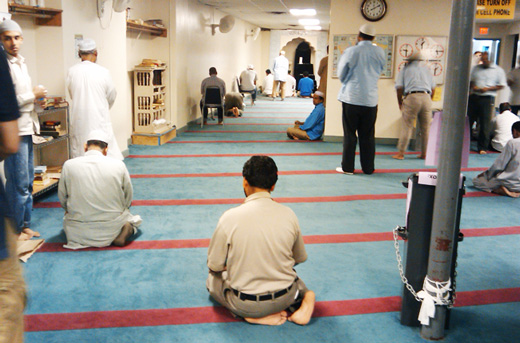
Short-Term Spaces
In a nondescript Pakistani restaurant on Church Street in Tribeca, South Asian women serve up curried meat and spinach cafeteria-style. Behind them, in a dark kitchen, someone is cooking over fire. The New Shezan Restaurant looks almost like a small, seedy family living room: There is always a handful of people drinking chai tea and watching, from a single table, the Indian version of “So You Think You Can Dance?” on a suspended television set. The occasional unrelated customer wanders in, eats a samosa, and wanders out. Until evening comes. At a quarter past seven something strange happens. Men begin to file in—Bluetooth still in left ear, car keys still in right hand—en masse. They do not greet anyone, just head promptly to the restroom, toward the back, to wash themselves and then proceed down an obscured set of stairs. Soon there is a long line for the lavatory, but no one in the restaurant, least of all the women behind the counter, seems to notice. There must be a hundred of them in the basement by now.
The stairs are narrow and force visitors to duck down low or risk knocking their heads on the ceiling. At the bottom, a mountain of onions and potatoes in mesh sacks. I climb over the vegetables and take a look around: not a taxi driver in sight, only sealed boxes and a few garbage bags. And then a cabbie who has followed me down opens a concealed door to a very large and immaculate room painted in fluorescent green. There is a shower stall in the room and a modest library of books on Islam. Fans, loud speakers and Muslim calendars detailing prayer times are fastened to the walls; a donation box sits in a corner. The men have left their shoes in wooden cubbyholes. They stand, kneel and stretch out on the carpeted floor, and then they leave almost as suddenly as they came in, making room for the newly-arrived.
Mohammad Malik, 38, wears a black baseball cap and has decided to move with his family to Houston this summer. It is nearly 8 p.m., and he is driving me from the New Shezan Restaurant to an art vernissage on West 56th Street. Malik has been in the United States since 2000, but was only able to bring his wife and three daughters over from Pakistan a year ago. It took him that long to become a citizen. Houses are cheaper in Houston, he says, and the city is calmer. “The big problem in New York is that you don’t have time for your family. When I come to my job at 5 p.m., my daughters are just getting back from the school. And when I come back to the house, they are asleep. And when they go to the school, I’m asleep. But at least they’re with me now.” Malik cannot even find a place to park the cab in his own Brooklyn neighborhood when his shift is over. The only spaces available at three in the morning are metered ones, meaning that he has to wake up at 8 a.m. to move the car. He plans on changing jobs in Texas.
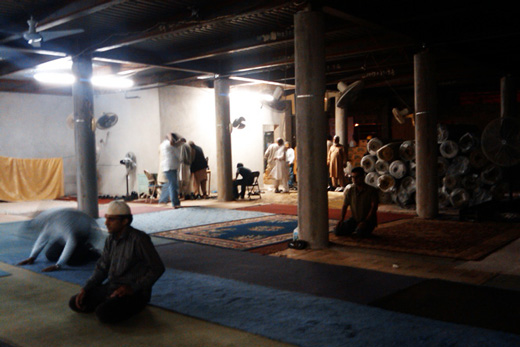
Malik prays at least once a shift at New Houston Auto Repair, a garage at the corner of Houston and Lafayette. His friend, the owner of the shop, has set up a small prayer room there and it isn’t too difficult to find a space nearby. “Prayer time begins in seven minutes,” he tells me. “I’ll drop you and go downtown to the garage. There’s so many mosques in Manhattan, but there’s no parking. And this prayer time is a short one; if you’re late, the prayer expires.” He never parks illegally “because then your concentration is not on the prayer. It’s not worth it. If you’re going for the worship then all your focus should be towards the prayer, not the parking.” Often, when he is running behind schedule, he prays inside the car. “God knows your conditions,” he says. “Money, you know, you can make it. But when the prayer is gone, it’s gone.” He turns on his off-duty sign as I get out of the cab.
The next day at 5:10 p.m. Malik is washing his feet in the black sink at Houston Auto. A taxi with its hood popped open blocks the entrance. Two more are propped up in the air, mechanics in navy blue uniforms laboring underneath them. It is little and unapologetically greasy, the way most garages are. The workers do not seem bothered by Malik, who balances on one leg as he scrubs the other. He leads me up some unstable metal steps like a fire escape, to a closet-sized room with Oriental rugs on the floor. He will do his asar prayer here and then start his shift. Today he is alone, but often he prays together with four or five other drivers—I cannot imagine how they all fit in here—and then they share food they bring from home. Anyone is welcome to use the prayer space; no one has to announce himself. “In the winter my friend puts the heat on and in the summer we got a fan,” Malik tells. It is storming out this afternoon and I think of the drivers caught at the airport. I ask Malik if they’ll pray behind the snack stand even in this weather. “We don’t care; we just pray.”
The vendor who works behind the counter at the LaGuardia snack stand calls himself Henry. He is an excited man from Bangladesh, who smiles even when he is angry, and has been feeding taxi drivers for the last 15 years. One evening, as the maghrib prayer period begins, Henry offers me a coffee and takes me around the back of his stall. About 30 men are standing with their heads bowed; one has taken on the part of the imam and is reciting the prayer aloud in Arabic. He points to a long tar-like smear near the roof. It takes a little while, but soon I understand that Henry affixed an awning to the stand to protect the praying cabbies from rain and snow about a year ago. He bought the covering himself from Home Depot and hired builders to help put it up. The entire operation cost him $5,000, which he paid out of his own pocket. The awning was up for almost a month when the Port Authority noticed and had the drivers take it down. Now the canopy is sitting in his living room at home. Henry doesn’t have much to say about it. He just keeps shaking his head. “Port Authority say no. They come here and they say no.”
The operations supervisor at LaGuardia tells me the Port Authority discovered the snack stand awning when a maintenance truck sideswiped it by accident. He explains that the drivers are not authorized to build anything on airport property. “What if every religion wanted to pray out there in the lot?” he asks heatedly. “This isn’t a place for prayer; it’s an airport. The Muslim drivers can’t just change the entire environment of a place that doesn’t belong to them. It might snowball.” If they wanted, they could submit a tenant alteration application, he says. But this would entail putting forward an entire architectural plan and “that’s not a cheap thing to do.”
The cabbies also pray in a nook near the Delta Air Lines terminal, below an overpass. The supervisor recalls they once tried to build flooring there out of sheets of plywood to avoid praying on the gravel. “It was a trip hazard. And it was right next to the walkway. Imagine, three feet from the sidewalk! People were scared to walk there; we got complaints. You know, with all this terrorist stuff . . . People mistakenly think they’re terrorists. And their carpets shouldn’t be there either; they’re going to be gone, too. Why can’t you just keep your rug in your car? Those rugs could be a sanitary hazard; they look like garbage to me. Listen, this airport is nondenominational. That’s why we stop religious people from soliciting in the hallways. I’d like to go to church during the day, I’m a religious man. But I have to go to work instead. If you need to pray all day, maybe taxi driver just isn’t the right job for you.”
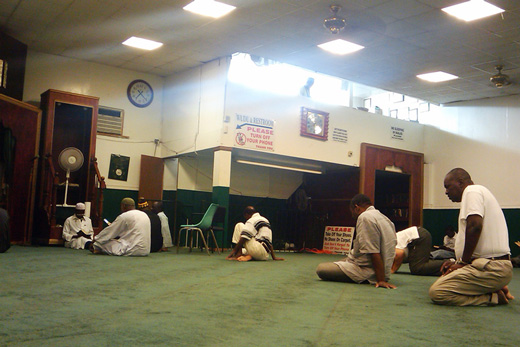
The Ritual Rush
On Friday afternoons at half past one peddlers selling Arabic CDs, elaborate floor mats, dates, imported cookies and wall plaques bearing the name of the Prophet line Third Avenue on the Upper East Side. A man with a halal food pushcart positions himself strategically in front of the entrance to the “96th Street Mosque” and waits for the rush. The Friday prayer, or jumu’ah prayer, replaces the regular afternoon dhuhr prayer. The most significant prayer of the week, Muslim men are required to perform it in congregation. The ornate turquoise room on the upper level of the Islamic Cultural Center—used only on Fridays and Islamic holidays—holds 1,000 worshippers at capacity. The smaller space on the main floor can accommodate 400. But there are still more devotees, and they spill out onto the lawn in front of the mosque’s open door so they can hear the imam’s recitation. Men, women and children kneel in the grass. Every few seconds a straggler runs hysterically down the sidewalk and toward the imposing dome to join them, tossing off his shoes.
The stream of people that push out of the Center’s double doors when the prayer is over does not subside for nearly 20 minutes. The street vendors begin to call out; a man standing on a cardboard box begins to preach loudly. Older women in full hijab hold out cups and paper bags for handouts. Men rattle donation boxes and passersby stuff bills inside. A patrolling traffic control officer tells me they are still willing to turn a blind eye to illegally parked cars on Fridays at prayer time. (The officers are obligated to write out tickets if someone complains about their car being blocked.) Taxicabs are double-parked all the way down 97th Street. One is triple-parked. It looks like a Muslim funfair.
Out on the Street
The Mobil gas station on 51st Street and 11th Avenue seems empty. The West African man who usually sits behind the counter is outside pumping gas into someone’s Volkswagen. Inside, where the cash register and assorted snacks are, it is completely silent. But in the adjoining car service area taxi drivers are in prayer, holed up in a threadbare room that might once have held windshield washer fluid and oil. The station’s aged Pakistani manager prefers to kneel out in the open on two wooden boards covered with rugs. He is crouched underneath shelves that hold rubber tires. The station attendant, Omar Ouedraogo, 46, counted 200 the one time he kept track of how many cabbies came in to pray throughout the day. The nearby mosque, on 44th Street, only opens its doors in ten-minute spurts; it closes immediately after every prayer, rejecting the idea of the longer, more lenient prayer period. It is also known for kicking out devotees who lag behind. Ouedraogo says this is often the case in New York. Delayed drivers find themselves at the gas station.
Often they park up on the sidewalk in front of the fuel pumps, ready to risk a fine because the prayer only takes a few short moments. “Everyday someone gets a ticket,” Ouedraogo shrugs, and nods toward a circling police car. But policemen are welcome to pray in the space too, and some of them show up from time to time. Ouedraogo doesn’t get parking tickets, but even he has been chastised by the officers. “I’ve been doing the nightshift here for two years,” he tells me. “I work by myself, no one else. And I always open the door for people who want to come in and pray. The police have come to complain. What if one time I let someone in and something happens accidentally? It’s hard. I let everyone in at the risk of my own safety. But my boss set this up to give Muslims the opportunity to pray. Sometimes I lock the door so I have the chance to see who’s coming in, but then I have to open the door twenty, thirty times a night. Sometimes I’m outside pumping gas and I forget someone’s inside. But you know, the people just pray and there’s never a problem.”
Less than a ten-minute walk away, in Times Square, Omer Ozkaya, 25, meets tourists coming out of Broadway shows and takes them to the bars or back to their hotels in his bicycle rickshaw. He arrived from Turkey four months ago (“I am a New Yorker,” he beams) hoping to do a master’s degree in mechanical engineering. Instead he takes English language lessons in the morning and rides his cycle into the night. Often he prays in the car park on 43rd Street and Sixth Avenue, where his boss keeps the bicycles. “Sometimes the personnel don’t like,” he says. “I need water to wash so I have to use the restroom, and I have to ask the personnel to open the restroom every time. I don’t want to bother them, but you have to do it if you believe.”
Tonight Ozkaya prays at the mosque on 29th Street between Broadway and Fifth Avenue. It is dark out and there are no women here but me. The entrance to the mosque is like a recessed storefront and the house of worship is surrounded on all sides by dingy linoleum-floored restaurants. Post-prayer, hundreds of men rush Chandni, the largest eatery. They emerge with pita bread stuffed with meat and overrun the sidewalk. The mosque is open from 11:45 p.m. until midnight; when it is closed, practitioners pray in the restaurants. All of the surrounding streets are yellow with parked taxis. A cabbie who has been circling for nearly 15 minutes finally gets out of his car, moves a bicycle rickshaw onto the walkway and parks in the now vacant spot. The bicycle driver, livid, begins to bang with his hands on the taxi’s windshield. Most of the men look tired and fed up. Facing the mosque is a vast, vacant parking lot. But lots aren’t free.
It is difficult trying to negotiate a nomadic existence and the fickle demands of faith, hard on the spirit and, in the coldest months, hard on the body. They earn little, these drivers, and put up with too much. But, in an important way, they are free. They are not caged in cubicles or behind counters. They do not need to slink off and pray in office restrooms, risk being fired for neglecting shoppers. Rather than being the wrong job for people who need to pray, taxi driving seems in many ways the right one. The cab drivers have an off-duty sign and they can turn it on whenever they like. They have the freedom not to amend a ritual they want to go unchanged. “I worked in the restaurant for one day,” Ozkaya tells me. “And even the owner is Muslim. I told him I want—no, I have—to pray. I don’t want to break it. But he told me you can’t do it because customers might come.” Ozkaya has decided he won’t stay in New York City very long. Just long enough to kneel down by his bicycle in Central Park in the heat of summer.
Related links:
- Follow us on Twitter: @inthefray
- Comment on stories or like us on Facebook
- Subscribe to our free email newsletter
- Send us your writing, photography, or artwork
- Republish our Creative Commons-licensed content

